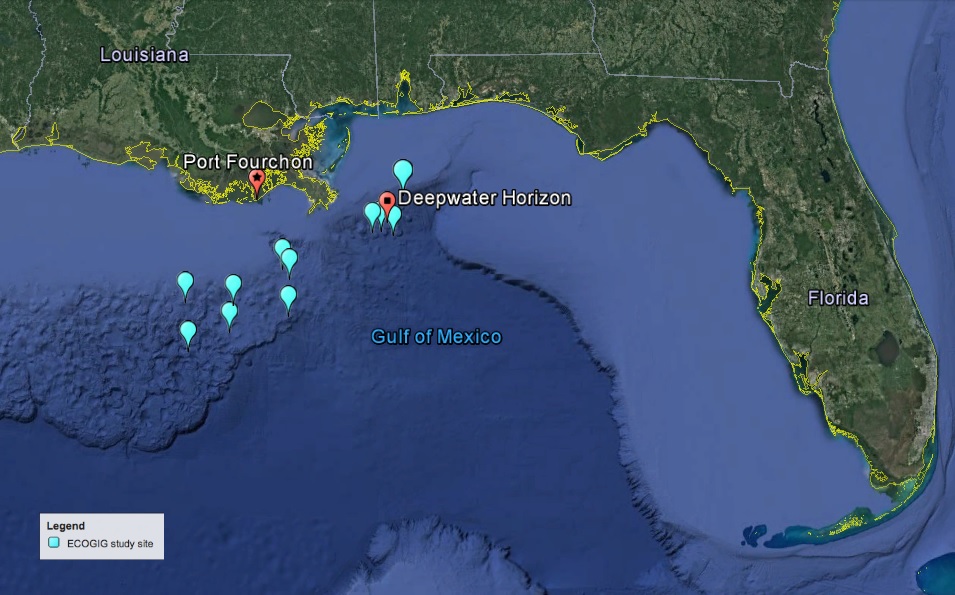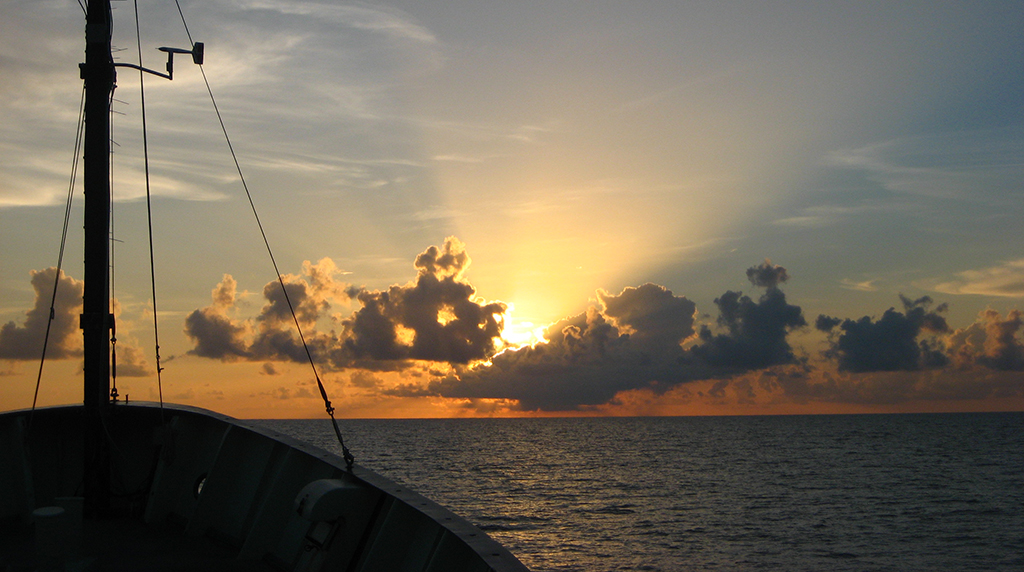Jewels of the Gulf: Deepwater Expedition
6/12/2017 - 6/22/2017
Live ROV Feed available throughout expedition
See our 3-part educational video series about deep sea corals
Podcast with Chief Scientist Iliana Baums
Scientific Goals
ECOGIG researchers - led by Chief Scientist Dr. Iliana Baums of Pennsylvania State University - will embark on a 12-day expedition in the Gulf on June 12, 2017 to investigate the impacts of oil, methane, and chemical dispersants on the deep sea ecosystem— in particular deep sea corals. Deep sea corals are ecologically important and provide vital habitat for marine life, including commercially important species like shrimp, crab and grouper.
A primary research focus of this expedition is to capture high-resolution photos of these ecologically important deep sea corals and document how oil, methane, and chemical dispersants resulting from the spill influence coral recovery and survival year after year. The team will send a remotely operated vehicle (ROV Global Explorer) to depths of over 1000 meters and use high-resolution cameras mounted on the ROV to capture hundreds of still images of corals they have been monitoring yearly since shortly after the spill in 2010. These photographic data will be collected and analyzed—along with images from prior expeditions—to document the spill’s impacts and improve understanding of the mechanisms that influence coral recovery and survival.
Team members from Penn State and USGS are also interested in better understanding how deepsea ecosystems in the Gulf respond to natural hydrocarbon seeps (areas of the seafloor where natural oil and gas-rich fluids seep into the ocean). Specifically, the researchers will study how corals, infauna (animals living in the sediments), and microbiomes (all microorganisms in a particular environment) of animals, sediments and the water column respond to natural seafloor hydrocarbon seepage.
Understanding how ecosystems respond to natural inputs of oil will help scientists analyze the biological and ecological effects of the 2010 oil spill. This research has implications that may inform management responses to anthropogenic hydrocarbon releases (human caused releases of oil and gas) that have already occurred and those that could potentially occur in the future.
PSU researchers will collect live corals from the seafloor to conduct laboratory-based experiments in an attempt to understand how these corals respond to marine snow (organic material that falls from upper waters to the deep ocean) that has become toxic due to oil and chemical dispersant inputs. The deposition of toxic marine oil snow is thought to be one of the mechanisms that impacted the deep sea ecosystems of the Gulf after the spill.
The population-level genetic structure and gene flow of the live coral samples will also be analyzed by a team member at Lehigh University via laboratory-based experiments. Learning more about how these deep sea corals are genetically different or similar to one another will further scientists’ understanding of how corals may recover from disturbances such as the Deepwater Horizon oil spill than others.
Communications and Outreach Activities
ECOGIG outreach and communication specialists aboard the ship during the expedition will connect with the public in a variety of ways. A live ROV camera feed will be accessible throughout the expedition on YouTube. School children and summer campers across the U.S. will interact with scientists onboard during live question and answer sessions, and in collaboration with Mission Blue, an interactive Facebook Live video hosted by Ocean Allison will be broadcast to a worldwide audience from the Gulf of Mexico.
Anyone can stay up to date on the research in real time by following along via ECOGIG’s Facebook, Twitter, and Instagram channels. Additional content including educational videos, podcasts and a documentary short film will become available after the expedition.
Connect with the Team and Learn More
Meet the Scientists Profiles
Live ROV Feed available throughout expedition
Expedition preview video
Cruise Blog
Facebook
Twitter
Instagram
#JewelsOfTheGulf
For the Media
Jewels of the Gulf Expedition Press Kit
General Press Release (May 25, 2017)
University of Georgia Press Release (June 1, 2017)
Press Coverage
University of Georgia researchers to study impact of Deepwater Horizon oil spill in Gulf of Mexico, Columbus Ledger-Enquirer, June 2, 2017
Science at Sea: Researchers Monitor Marine Ecosystems Near Deepwater Horizon, GoMRI News, June 2, 2017
Researchers return to Gulf of Mexico to Study Impacts of Oil Spill, Ocean News and Technology, June 2, 2017
Jewels of the Gulf: Deepwater Expedition, Mission Blue E-newsletter, June 2, 2017
A Deepwater Expedition to Study "Jewels of the Gulf", Lehigh University News, June 14, 2017
6 Things You're Missing if You're Not Watching Deep-sea Research Live Feeds, Ocean Conservancy, June 20, 2017
ECOGIG Study Sites in the Gulf of Mexico

Deepwater corals imaged during the September 2016 cruise. (c) ECOGIG
View Cruise Blog
2016 Fall Mooring and Lander Cruise
9/11/2016 - 9/16/2016
The main goals of the Fall 2016 Pt. Sur cruise are to recover and redeploy the mooring at station OC26 in the Gulf, and recover the nearby lander. That lander will be deployed at GC767 along with 3 “mini landers” from UNC. In addition to this work, we will do some extended pumping/filtration of hydrocarbons, test a new imaging and lander deployment system, obtain some marine snow abundance profiles, and acquire samples for shipboard laboratory analyses.
View Cruise Blog
2016 Endeavor Cruise
7/23/2016 - 8/15/2016
This cruise takes the ECOGIG research team back to the Gulf of Mexico to continue their research assessing the ecological impacts of the 2010 Deepwater Horizon accident (Macondo oil well blowout). This cruise will allow ECOGIG researchers to collect water column and sediment samples from a number of research sites in the Gulf in order to track the impacts of anthropogenic oil and compare them to natural oil and gas seeps and control sites.
2 gliders were deployed on July 14th to record information about the conductivity, temperature, depth, bio-optics and oxygen at several ECOGIG research sites in the Gulf. There is a glider rated for 200m (600ft) of water that will measure at GC600, and a glider rated for 100m (300ft) that will move between control sites and other areas of interest. The gliders are currently reporting data from their positions every 5 hours, which is viewable here. The scientific party on the R/V Endeavor plans to recover these gliders during the current cruise.
10 undergraduate students and 2 faculty, all participating in the STEM SEAS program join ECOGIG's Dr. Joseph Montoya and several graduate students onboard the R/V Endeavor as it transits from Morehead City, NC to Gulfport, MS. The STEM SEAS students will learn more about ECOGIG's research as well as general oceanographic research on the trip!
View Cruise Blog
2015 Endeavor Cruise
5/29/2015 - 6/21/2015
Purpose of cruise: This cruise took the ECOGIG team back to the Gulf of Mexico to continue their research to assess the ecological impacts of the 2010 Deepwater Horizon accident and Macondo oil well blowout. This cruise allowed the scientists to collect water column and sediment samples to track Macondo impacts and compare the processes observed in Macondo-influenced areas to natural seeps and control sites.
Undergraduate student Drake Lee-Patterson blogged from the cruise.
View Cruise Blog
2014 Pelican Cruise #4
9/18/2014 - 9/22/2014
Purpose of Cruise: To recover and re-deploy moorings, acquire multicores & test optical features with sampling equipment, collaborate with Teledyne on Webb profiler work, and other sampling and glider tests.
View Cruise Blog
2014 Nautilus Cruise
6/22/2014 - 7/4/2014
Purpose of cruise: The team will focus on deep-sea corals, animals that live on and around them, and their response to the DWH oil spill. To do so, they will re-image as many as possible of the same corals that they have followed over the last 4 years and collect samples for analyses of coral and microbe response to natural seepage. This cruise will utilize two premier Remotely Operated Vehicles to conduct research at the bottom of the Gulf: ROV Hercules and ROV Argus. Live feeds at www.nautiluslive.org
View Cruise Blog
2014 Pelican Cruise #2
5/1/2014 - 5/6/2014
Purpose of cruise: ECOGIG researchers will recover and re-deploy two mooring arrays that have been deployed in the Gulf for over a year. These arrays have been collecting material that is settling through the water column. Time series collections of this material are stored autonomously in individual cups over the time of the deployment, and will provide information about the composition of the material, its origin, and whether it came straight from the surface or was first deposited on the ocean floor and then re-suspended into the water column by currents.
View Cruise Blog
2014 Atlantis Cruise
3/29/2014 - 4/22/2014
Purpose of cruise: To revisit and obtain water and sediment samples from sites around the wellhead and the natural hydrocarbon seep at GC600. We measured rates of hydrocarbon concentrations and turnover as well as performed detailed microbiological surveys.
The final cruise report from this expedition is available here
View Cruise Blog
2014 Pelican Cruise #1
3/6/2014 - 3/13/2014
Purpose of cruise: To service, deploy, and recover custom in situ experimental packages designed to assess various components of deepwater hydrocarbon cycling
View Cruise Blog
2013 Pelican Cruise #5
10/5/2013 - 10/14/2013
Purpose of cruise: Recovery and deployment of landers and other equipment.
View Cruise Blog
2013 Pelican Cruise #4
8/30/2013 - 9/8/2013
Purpose of cruise: AUV mapping
View Cruise Blog
2013 Endeavor Cruise #1
6/18/2013 - 7/5/2013
Purpose of cruise: Investigated various water column and benthic processes in the Gulf of Mexico.
View Cruise Blog
2012 Falkor Cruise #1
11/4/2012 - 11/19/2012
Purpose of cruise: Exploration of the water column with an ROV, multi-coring the sediment
View Cruise Blog
2012 Endeavor Cruise #3
9/4/2012 - 9/17/2012
Purpose of cruise: Water column sampling and sediment multi-coring in the Gulf of Mexico
View Cruise Blog
2012 Endeavor Cruise #2
6/22/2012 - 7/5/2012
Purpose of cruise: Water column sampling and sediment multi-coring in the Gulf of Mexico
View Cruise Blog


















 back to top
back to top